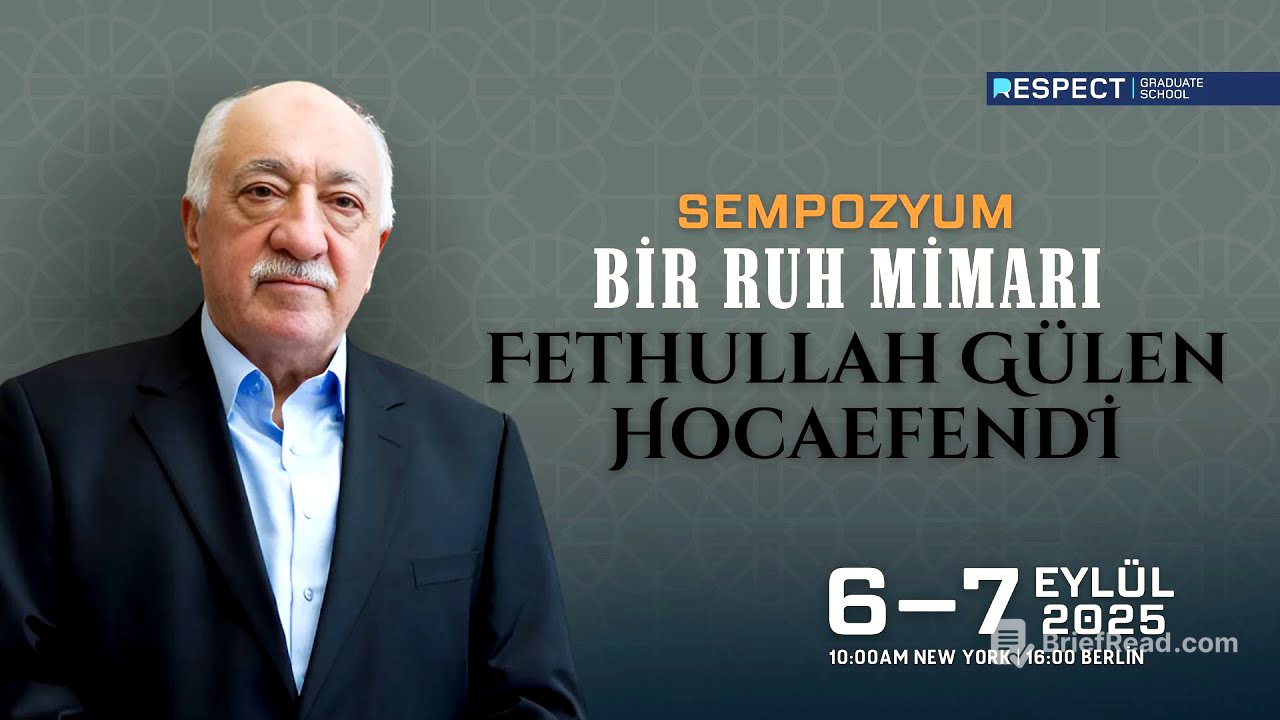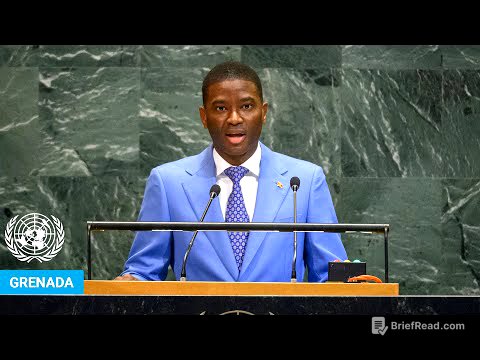TLDR;
This video features a symposium honoring Fethullah Gülen, focusing on his intellectual heritage and contributions to spiritual architecture, education, social peace, and universal values. The symposium includes speeches and presentations from various academics, exploring Gülen's views on science, leadership, culture, art, and dialogue.
- The symposium honors Fethullah Gülen's intellectual legacy.
- Academics discuss Gülen's views on science, leadership, and social peace.
- The event emphasizes universal values and dialogue.
Introduction to the Symposium [0:20]
The symposium, titled "Fethullah Gülen Hoca Efendi, an Architect of the Soul," is scheduled for September 6-7, 2025. It will feature 22 academics presenting papers on Gülen's intellectual legacy, covering topics such as his view of science and leadership, social peace building, universal values, and educational views. The symposium aims to explore Gülen's contributions to culture, art, family, society, media, communication, and dialogue services. The event will be broadcast live on hizmetten.com and the Respect Turkish YouTube channel.
Opening Remarks and Fethullah Gülen's Legacy [3:25]
The speaker emphasizes Fethullah Gülen's role as an heir of the prophets and a scholar who dedicated his life to serving humanity. Gülen's service model, rooted in Islamic principles and universal human values, has been implemented across various geographies. The speaker highlights Gülen's devotion to the Quran and Sunnah, his respect for past scholars, and his original approaches to religious disciplines. The symposium aims to explore Gülen's intellectual heritage from interdisciplinary perspectives, requiring explanations of his thought and action.
Abdullah Aymaz's Message: The Importance of Continuous Contribution [11:30]
Abdullah Aymaz discusses the importance of continuously contributing to the understanding of faith and the Quran, referencing a spiritual conversation about the Risale-i Nur. He explains that while a single treatise on faith may seem sufficient, the ongoing effort to explain and elaborate on these truths is necessary because it is like repairing a vast castle of Islam and humanity, which has been damaged over centuries. This effort addresses the denial and void in people's hearts caused by movements disguised as science that break away from faith.
Naci Tosun's Perspective: Servitude to Allah and Avoiding Exaggeration [23:36]
Naci Tosun emphasizes Fethullah Gülen's servitude to Allah and his constant prayer as the foundation of his success. He warns against attributing divine qualities to individuals, including those we admire, as it can lead to mistakes and place an unbearable burden on them. Tosun highlights Gülen's efforts to bring people together, promote living for the sake of keeping others alive, and instill the importance of migration in the way of Allah. He recounts Gülen's role in fostering unity among diverse groups, including different religions and ethnicities, and his emphasis on serving humanity.
Cemal Türk's Reflections: The Spiritual Architect and Inspiration from Gabriel's Hadith [41:10]
Cemal Türk reflects on the title of the symposium, "A Spiritual Architect," and shares memories related to Fethullah Gülen's works. He recalls a discussion about naming a book of editorials, where Gülen chose "Erecting the Statue of Our Soul," emphasizing the importance of the soul. Türk also recounts a conversation about Gabriel's Hadith, suggesting that the name of Gülen's book was inspired by the hadith, which describes Islam as faith, body, and charity. He connects these ideas to Gülen's efforts to build souls and hearts with concepts from the Quran and Sunnah, breathing resurrection into them.
Announcements and Upcoming Sessions [52:24]
Announcements are made for upcoming programs, including "Qualifications of the Earthly Heirs" and "Emerald Hills of the Heart" readings. The session will explore the ideal shaped under Fethullah Gülen's leadership, focusing on faith, thought, morality, knowledge, and action. The program aims to understand and build a new generation with integrity, revealing the reality of humanity and attaining the hidden best qualities in every human being.
Session 1: Exploring Islamic Sciences from Fethullah Gülen's Perspective [58:26]
The first session, chaired by Professor Dr. Ismail Albayrak, focuses on the scientific aspect of Fethullah Gülen's teachings. Professor Dr. Ayhan Tekineş discusses Gülen's perspective on Islamic sciences, emphasizing the importance of tecdid (renewal) and the reintroduction of Islamic sciences. Tekineş highlights Gülen's approach to science, which combines the definitions of theologians, logicians, and Sufis, emphasizing the relationship between humans and the universe.
Ayhan Tekineş's Presentation: Fethullah Gülen's Approach to Islamic Sciences [1:02:33]
Ayhan Tekineş explains Fethullah Gülen's comprehensive view of science, which integrates rational and transmitted knowledge. Gülen emphasizes the importance of reading and writing, as well as the role of the heart and soul in understanding the universe. Tekineş discusses Gülen's dual approach to transmitted sciences, distinguishing between scientific treatment and scientific inquiry. He highlights Gülen's emphasis on the Quran and Sunnah as the foundation of all sciences and his appreciation for the contributions of Muslim scientists throughout history.
Irfan Yılmaz's Presentation: Fethullah Gülen's Balanced View on Religion and Science [1:25:05]
Irfan Yılmaz discusses the relationship between science and religion, emphasizing that true science and true religion do not conflict. He recounts Fethullah Gülen's early encounter with a book that claimed science and religion were contradictory, which motivated him to develop a balanced perspective. Yılmaz explains how Gülen integrated scientific truths with Islamic teachings, encouraging the pursuit of knowledge while maintaining faith. He highlights Gülen's emphasis on interpreting the Quran in light of contemporary science and his belief in the importance of research and flexibility in understanding scientific advancements.
Mehmet Çınar's Presentation: Fethullah Gülen's Spiritual Life and Sufism [1:47:10]
Mehmet Çınar discusses Fethullah Gülen's spiritual life and his approach to Sufism, emphasizing the importance of integrating knowledge and action. He explains that Sufism, in its original form, is rooted in the Quran, hadith, and the lives of the companions, and that it aims to achieve moral maturity and consciousness of Allah's benevolence. Çınar highlights Gülen's emphasis on the unity of knowledge and action, which leads to good morals and the fulfillment of the purpose of prophethood.
Session 2: Leadership and Social Peace - Introduction [2:30:25]
The second session, chaired by Hilal Akdeniz, focuses on leadership and social peace, exploring Fethullah Gülen's ideas and practices in these areas. The session features presentations from Dr. Fevzi Saraç, Abdulhamit Bilici, and Professor Dr. Mehmet Ateş, who will discuss Gülen's leadership model, his approach to social peace, and his role as a mediator.
Fevzi Saraç's Presentation: Fethullah Gülen's Leadership Model [2:35:33]
Dr. Fevzi Saraç discusses Fethullah Gülen's leadership model, emphasizing its spiritual foundations and transformative character. He identifies six main spiritual principles that shape Gülen's leadership: sincerity, awareness of trust and responsibility, humility, justice, compassion, and direction. Saraç compares Gülen's leadership with that of Mahatma Gandhi and Nelson Mandela, highlighting common values such as justice, humility, and social responsibility. He also analyzes Gülen's leadership in the context of contemporary leadership theories, noting its alignment with transformational, servant, and situational leadership approaches.
Abdulhamit Bilici's Presentation: Fethullah Gülen's Perspective and Three-Dimensional Peace [3:03:14]
Abdulhamit Bilici shares his observations from a visit to Kirkuk in 2008, highlighting the cosmopolitan structure of the city and the tensions between different groups. He recounts his visit to Kirkuk Çağ College, where he witnessed a peaceful environment despite the surrounding violence. Bilici attributes this to Fethullah Gülen's perspective and the practice of three-dimensional peace: individual peace (marriage of heart and mind), transcendental peace (balance between worldly and hereafter), and social peace (dialogue and coexistence).
Mehmet Ateş's Presentation: Mediation and Solution-Oriented Approach in Fethullah Gülen's Teachings [3:25:27]
Mehmet Ateş discusses Fethullah Gülen's teachings on mediation and solution-oriented approaches, emphasizing the importance of being a bridge-builder and finding common ground. He highlights Gülen's emphasis on universal human values, such as justice, mercy, and truth, as the foundation for social construction. Ateş also discusses Gülen's approach to dialogue and tolerance, emphasizing the need to understand others and build relationships based on respect and empathy.









